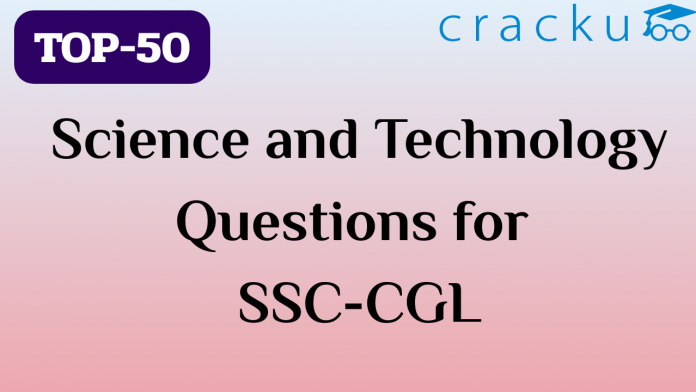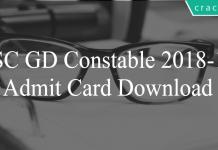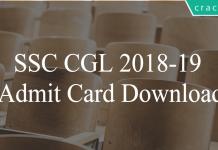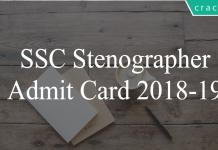TOP-50 Science and Technology Questions for SSC-CGL
Latest and Most Important Questions on Science and Technology to crack SSC-CGL Exam. Download the PDF and go through the video explanations of the most important questions on Science and Technology and practice them by downloading the PDF provided below. Feel free to visit our website to get access to the free content.
Download TOP-50 Science and Technology Questions PDF
Read this Post in Hindi
Question 1: How many astronauts have walked on the moon?
a) 2
b) 5
c) 8
d) 12
Question 2: Cyanide poisoning causes death in seconds because
a) It denatures enzymes of the heart/muscle
b) It breaks the electron transport chain
c) It causes Lys is of red blood cells.
d) It causes cardiac arrest
Question 3: For a missile launched with a velocity less than the earth’s escape velocity, the total energy is
a) either positive of negative
b) Negative
c) Zero
d) Positive
Question 4: Which edition of Indian Science Congress has been recently held in Jalandhar, Punjab?
a) 104th
b) 107th
c) 106th
d) 105th
Question 5: What is the theme of the 2019 “Indian Science Congress”?
a) Future India : Science & Technology
b) Future World : Science & Technology
c) New India : Science & Technology
d) Favourite of India : Science & Technology
Question 6: The acid present in the stomach which helps in the digestion of food is”:
a) Nitric acid
b) Sulphuric acid
c) Hydrogen chloride
d) None of the above
Question 7: In terms of size, Jupiter ranks no. in our Solar System.
a) 1
b) 2
c) 3
d) 4
Question 8: “Sirius”, the brightest star outside solar system, is also called ……………
a) Cat star
b) Dog star
c) Fox star
d) Lion star
Question 9: Carbohydrates are compounds of
a) Carbon, oxygen and hydrogen
b) Carbon, nitrogen and hydrogen
c) Carbon and nitrogen
d) Carbon and hydrogen
Question 10: What is the pH of distilled water?
a) 0
b) 3
c) 7
d) 10
Question 11: When the level of air pollution of a place is tested, the term PM2.5 is generally used. What does 2.5 indicate?
a) The duration of the test
b) The dimensions of the pollutant
c) The number of pollutants
d) The average of 2.5 months between the readings
Question 12: A person opens his mouth on hearing a thunder in order to
a) equalise pressure of air on both sides of the ear drum
b) receive more sound
c) allow air to come out of the mouth
d) overcome fear
Question 13: Who is the third astronaut who traveled to the Moon along with Neil Armstrong and Buzz Aldrin?
a) Patrick Miller
b) Steven Edwards
c) John Young
d) Michael Collins
Question 14: In the context of photosynthesis, what is the full form of ATP?
a) Ammonium Tri Phosphate
b) Adenosine Tri Phosphate
c) Aluminium Tri Phosphate
d) Actinium Tri Phosphate
Question 15: What is the original name given to the planet Uranus?
a) Atlantis
b) Georgium Sidus
c) Romanian Angelica
d) Zeus Taros
SSC CGL Previous Papers Download PDF
Question 16: What is the rate of change of velocity called?
a) Distance
b) Speed
c) Momentum
d) Acceleration
Question 17: Which ancient Indian physician and son of Sage Vishwamitra, is referred to as “the father of surgery”?
a) Charaka
b) Suśruta
c) Dhanvantari
d) Chanakya
Question 18: What is the molecular shape of DNA?
a) spherical
b) double helix
c) Triple spherical
d) Rounded Helix
Question 19: What percentage of world’s freshwater is stored as glacial ice ?
a) 50%
b) 10%
c) 70%
d) 30%
Question 20: The distance between galaxies is usually measured in what units?
a) meters
b) light years
c) kilo light years
d) kilometers
Question 21: Which law of physics makes a perpetual motion machine impossible?
a) first law of thermodynamics
b) second law of thermodynamics
c) third law of thermodynamics
d) first and second laws of thermodynamics
Question 22: The type of tail found in Shark is
a) homocercal
b) heterocercal
c) diphycercal
d) protocercal
Question 23: Recently, AIDS Research Institute has conducted HIV vaccination on humans. Among these which country has developed the vaccination?
a) South Africa
b) USA
c) India
d) Britain
e) Germany
Question 24: Silicon is a polymer of
a) Silicon tetrachloride
b) Dialkyl dichloro silane
c) Silane
d) Tetraalkyl silane
Question 25: The brightest planet is
a) Venus
b) Mercury
c) Jupiter
d) Mars
Question 26: Which is the smallest moon in the solar system?
a) Titan
b) Callisto
c) Ganymede
d) Deimos
Question 27: What is the scientific name of the study of skin diseases?
a) Dermatology
b) Entomology
c) Ornithology
d) Mammalogy
Question 28: What is the scientific name of neem plant?
a) Azadirachta indica
b) Mangifera indica
c) Malus domestica
d) Chrysophyllum cainito
Question 29: The instrument used for measuring air pressure is called …..
a) Anemometer
b) Barometer
c) Hygrometer
d) Thermometer
Question 30: How much time does it take for the sunlight to reach the Earth?
a) 9 minutes 21 seconds
b) 8 minutes, 20 seconds
c) 1 nano second
d) 12 minutes
SSC CGL Previous Papers Download PDF
Question 31: The moon takes to orbit one revolution around the earth with respect to stars is called ____month?
a) Lunar
b) Synodic
c) Sidereal
d) Lunar – Sidereal
Question 32: How many submarines does India has currently?
a) 15
b) 68
c) 24
d) 13
Question 33: The study of stars, planets and space is called_____?
a) Astronomy
b) Aerostatics
c) Aerospace
d) Autonomy
Question 34: Where is the headquarters of the ISRO?
a) Mumbai
b) Delhi
c) Bangalore
d) Hyderabad
Question 35: How many Indians have been to space so far?
a) 0
b) 1
c) 2
d) 3
Question 36: Which is the lightest metal?
a) Lithium
b) Hydrogen
c) Nickel
d) Rhodium
Question 37: How many successful satellites are in the orbit operated by Indian Regional Navigation Satellite System (IRNSS)
a) 8
b) 5
c) 7
d) 9
Question 38: Honey bee and ants were related to which class ?
a) Insect
b) Bacteria
c) Hopper
d) None of these
Question 39: Preventing rain water to run-off and its accumulation and deposition for re-use on site is called
a) rain water collection
b) micro- dams
c) micro-accumulation
d) rain water harvesting
Question 40: The frequency band of UHF is
a) 300 GHZ
b) 400 – 960 GHZ
c) 400-470 GHZ
d) 40 GHZ
Question 41: Synovial fluid is found in the
a) Muscle
b) Kidney
c) Liver
d) Joints
Question 42: Equipment earthing gives protection against
a) voltage fluctuation
b) overloading
c) electric shocks
d) high temperature of conductors
Question 43: A sudden fall in barometer reading indicates
a) clear weather
b) hailstorm
c) storm
d) heavy rainfall
Question 44: The source of solar energy is ?
a) Nuclear fission
b) Nuclear fusion
c) Sinking of the sun
d) None of these
Question 45: A dynamometer is an equipment used to measure
a) current and voltage of generator
b) dynamic loads over cyclic times
c) fatigue propagation due to dynamic loads
d) torque and power of an engine
SSC CGL Previous Papers Download PDF
Question 46: Who discovered the first antibiotic ?
a) W Fleming
b) C Waksman
c) Louis Pasteur
d) A Fleming
Question 47: What did Alexander Graham Bell discover?
a) Typewriter
b) Telephone
c) Telescope
d) Television
Question 48: Acceptable “Noise Pollution Level” in India range between:
a) 16 – 35 dec
b) 40 – 45 dec
c) 70 – 100 dec
d) 10.- 15 dec
Question 49: How much of the Earth’s land surface is desert ?
a) 1/10th
b) 1/5th
c) 1/3rd
d) 1/6th
Question 50: Transcription means the synthesis of
a) Lipids
b) Protein
c) DNA
d) RNA
SSC CGL Previous Papers Download PDF
Answers & Solutions:
1) Answer (D)
2) Answer (D)
3) Answer (B)
4) Answer (C)
5) Answer (A)
6) Answer (C)
7) Answer (A)
8) Answer (B)
9) Answer (A)
10) Answer (C)
11) Answer (B)
12) Answer (A)
13) Answer (D)
14) Answer (B)
15) Answer (B)
16) Answer (D)
17) Answer (B)
18) Answer (B)
19) Answer (C)
20) Answer (B)
21) Answer (D)
22) Answer (B)
23) Answer (C)
24) Answer (A)
25) Answer (A)
26) Answer (D)
27) Answer (A)
28) Answer (A)
29) Answer (B)
30) Answer (B)
31) Answer (C)
32) Answer (A)
33) Answer (A)
34) Answer (C)
35) Answer (B)
Rakesh Sharma is the only Indian in space so far.
36) Answer (A)
37) Answer (C)
38) Answer (A)
39) Answer (D)
40) Answer (B)
41) Answer (D)
42) Answer (C)
43) Answer (C)
44) Answer (C)
45) Answer (D)
46) Answer (D)
47) Answer (B)
48) Answer (B)
49) Answer (B)
50) Answer (C)





